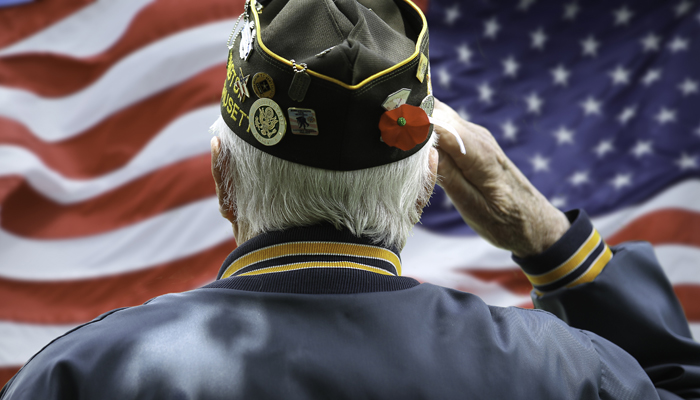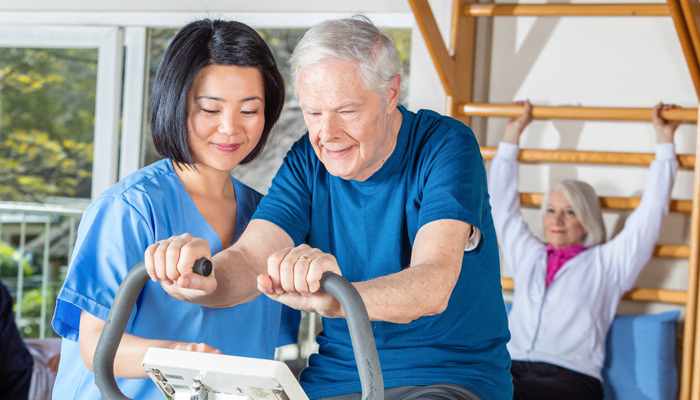Aging Well Together News
Helpful tips for family caregivers
November/December 2018
Things aren’t always how they seem. For instance, if your loved one is a veteran, he or she may begin to experience PTSD symptoms later in life after years of never talking about wartime experiences. Or, for yourself, you may be struggling with the doldrums, but taking time to notice even just three little positives each day can actually help you ward off depression. Then there’s the stamina of a loved one with COPD. You might think that physical activity is a thing of the past. Actually, even just a little supervised exercise can go a long way toward improving endurance—and clearer thinking! Sometimes life can be surprising.
Late-life veterans' issues
 If the person you care for is a combat veteran, you may not have heard much about those experiences. You are not alone.
If the person you care for is a combat veteran, you may not have heard much about those experiences. You are not alone.
In generations past, veterans made it a point to put the war behind them and “forget.”
But things can take a dramatic turn in later life. As they face the challenges of serious illness, many vets start having symptoms that appear to be a delayed form of PTSD.
Common triggers
Physical pain, need for medication, or dependence on others can bring up old, traumatic memories. Dad may start to have nightmares or insomnia. Or you might notice an unexplained change in Mom’s temperament. Researchers believe this comes on because the stress of illness makes it too hard for the mind to continue suppressing the bad memories. For instance:
- Trouble breathing from an illness such as COPD brings up past anxieties.
- Pain can provoke memories of one’s own or another’s injuries.
- Medications for pain or other conditions can cause fuzzy thinking. This in itself interferes with keeping combat memories at bay.
Moral and spiritual concerns
Sadly, combat veterans have seen the worst humanity has to offer. Your family member may have had to bury feelings about things he or she was called on to do in the line of duty. As the reality of “meeting one’s maker” draws closer, however, overpowering emotions of shame, guilt, and regret may arise.
What you can do
Veterans typically don’t like to talk about their wartime experiences. But they will talk with another vet. The Veterans Administration is aware of these late-life issues. They have counseling available for vets and for family members. In addition, hospice and palliative care programs often have a “We Honor Veterans” program. Their practitioners are specially trained to support the care needs of those who selflessly answered the call of duty.
Savoring good experiences
 Sharing happy experiences, like sharing a good meal, warms and strengthens friendships and family bonds. There are other benefits to savoring positive experiences. Even in the privacy of your own thoughts, reflecting on pleasant memories is an easy and effective way to increase your overall happiness.
Sharing happy experiences, like sharing a good meal, warms and strengthens friendships and family bonds. There are other benefits to savoring positive experiences. Even in the privacy of your own thoughts, reflecting on pleasant memories is an easy and effective way to increase your overall happiness.
Hard wired to focus on the negative
Have you noticed that even a small negative event can grab your attention repeatedly over the day? Positive events, by contrast, rarely come back to mind. That’s human. Our brains are hard wired to pay attention to threats.
Retraining our brains
As a family caregiver, you may find yourself focused on the things that aren’t going well. This zaps your energy. It also sets you up for depression, a common occurrence when caregiving. Fortunately, as humans we can retrain our brains to notice the positive for a more-balanced assessment of our days.
Try this exercise
- Before bed, write down three good things that happened over the day. They don’t have to be big events. Just things that felt positive. Maybe a good conversation or a leisurely walk. Include as much detail as you can.
- For each one, also write down “why” it was positive. Knowing what uplifts you tunes you into future opportunities for positive activities.
- Take 30 seconds to relive or savor each memory. Close your eyes. Were there particular smells at the time? Sounds? Thoughts? Immerse yourself in the full memory of the event.
- If possible, tell others about the event over the next few days. The recounting of it helps seal it in your awareness.
Why it works
“Neurons that fire together wire together.” The more memory traces you create of positive experiences, the more adept your brain will become at recognizing the positives. You won’t lose your ability to identify threats. But you will form more-accurate assessments of your life and increase your overall sense of happiness.
Exercise and COPD: an oxymoron?
 Does Mom say she feels too weak to exercise? Does Dad run out of breath just walking down the street?
Does Mom say she feels too weak to exercise? Does Dad run out of breath just walking down the street?
People dealing with COPD often believe that exercise will make things worse.
Actually, in moderation, quite the opposite is true.
Very real benefits
Even people with severe COPD can become more physical. Something as simple as arm lifts or singing can improve breathing and reduce fatigue. Exercise also helps with the fuzzy thinking many older adults experience with their COPD—because it gets more oxygen to the brain. Plus, people who engage in physical activity even just three times a week have been able to reduce the severity of COPD flares. If they have to be hospitalized, they get home sooner. Best of all, it’s not that hard to achieve these improvements.
Talk with the doctor first.
Don’t challenge your loved one to a mile starting out! A balanced approach is required with COPD. The goal is to stretch breathing capability and stamina a little bit at a time without getting overly tired. Your family member’s doctor can give guidelines about when to stop and when to push past that initial feeling of “today is not a good day.”
Ask for pulmonary rehabilitation.
The doctor may be able to prescribe a special exercise class for people with COPD. Exercising under supervision supports your loved one to feel safe. A class also presents the chance to talk with others who face the same challenges, which helps combat the isolation and depression that are common with COPD.
Tips for making it easier
Have your loved one
- pick an activity that is pleasurable;
- start small and increase gradually;
- find an exercise buddy. This adds fun and supports commitment;
- ask to be trained on “pursed lips breathing.” This technique makes it easier to exhale deeply and bring in enough oxygen.


